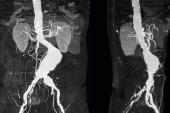FDA Safety Communication Updates Stance on Endologix AAA Grafts
Based on input from an advisory panel and its own analysis, the agency recommends the graft systems in select situations only.

More than 2 years after serious concerns were raised about increased risk of endoleaks associated with Endologix AFX endovascular abdominal aortic aneurysm (AAA) graft systems, the US Food and Drug Administration today urged operators to avoid the devices, where possible.
“Based on the FDA’s analysis and advisory committee input, the FDA recommends healthcare providers consider using available alternative treatment options for AAA patients rather than the AFX2 device,” the agency said.
The FDA communication today follows a meeting of the agency’s Circulatory System Devices Panel in November 2021 where advisors concluded that currently available AFX2 endovascular grafts should not be used in routine AAA treatment, but that they should remain available for use in select populations and in clinical situations where alternative treatment options are insufficient or unavailable.
The advisory panel reached their conclusions after reviewing endoleak data that emerged back in 2019, presented as an abstract at the American College of Surgeons’ Clinical Congress that year. The registry data in the abstract suggested a 2.5% cumulative probability of needing additional procedures for type III endoleaks at 2 years in patients treated with any Endologix graft for AAA repair (AFX with Strata, AFX with Duraply, or the currently marketed AFX2). Those findings prompted an FDA safety communication in late 2020 noting that an advisory committee had been convened. Previous to that, the only concerns were in regard to the discontinued AFX with Strata, which led to a warning from FDA, followed by the agency’s conclusion that AFX with Strata alone was responsible for a spate of endoleak cases reported to the Medical Device Reporting (MDR) system database.
Also, the FDA said it is taking additional steps “including working with the manufacturer to identify patients who may benefit from treatment with the AFX2 device and to update the device labeling.” Further data collection and evaluation also are continuing in conjunction with the manufacturer to assess long-term safety. For now, the agency says it remains uncertain whether the increased type III endoleak risk has been mitigated by the AFX2 iteration of the device.
In addition to the annual imaging follow-up, the FDA says patients who have any Endologix graft who develop type III endoleaks should be urgently evaluated for additional endovascular or surgical procedures.
L.A. McKeown is a Senior Medical Journalist for TCTMD, the Section Editor of CV Team Forum, and Senior Medical…
Read Full BioSources
US Food and Drug Administration. Update on risk of type III endoleaks with use of Endologix AFX endovascular AAA graft systems—FDA safety communication. Published and accessed on: January 13, 2022.




Comments